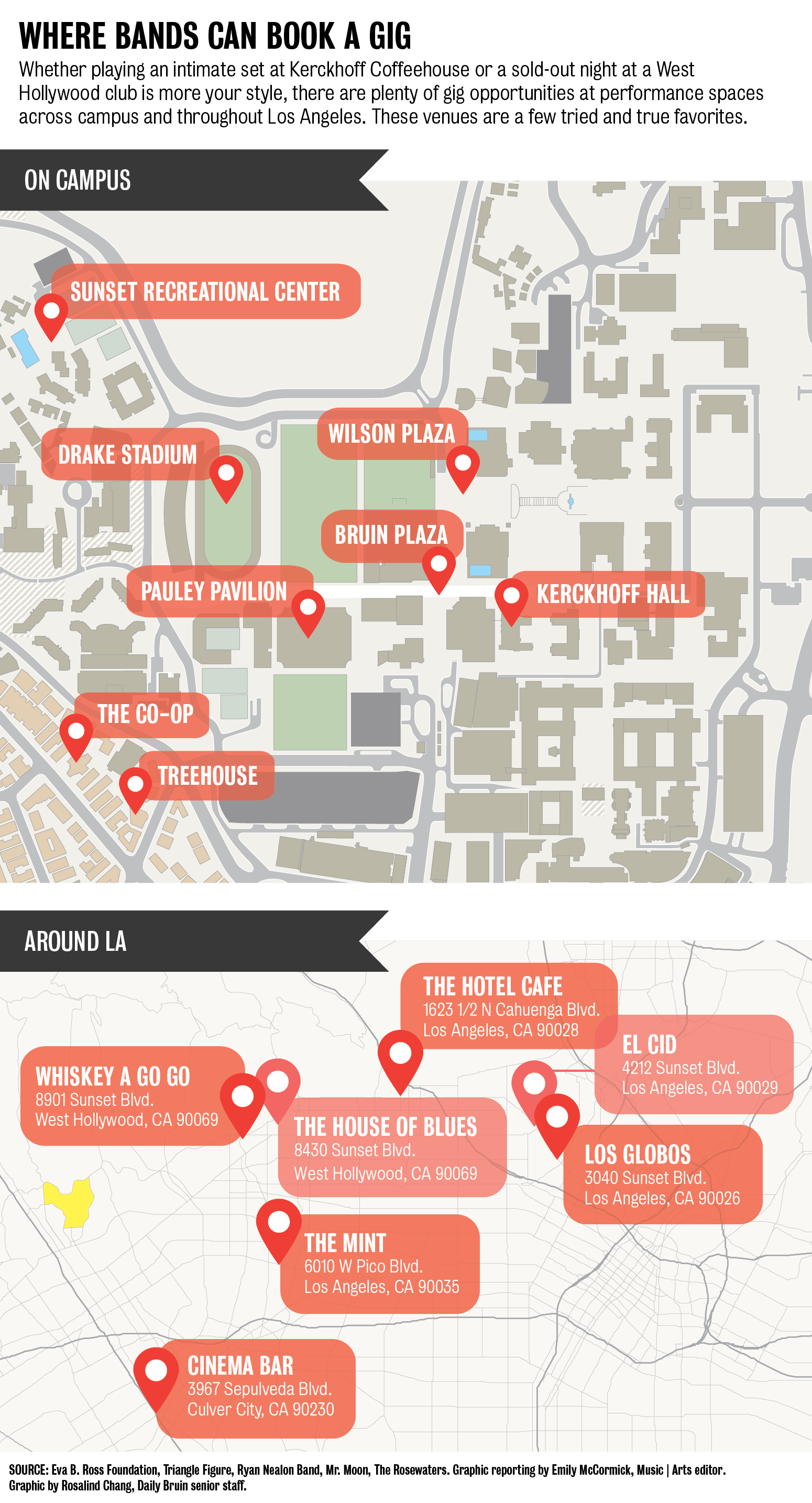College is a time for experimentation, and the musically inclined may become band-curious. In the heart of the Los Angeles music scene, UCLA has ample opportunities for budding rock stars and pop divas to fulfill their artistic urges by starting a band.
To call UCLA a breeding ground for great bands is hardly an understatement. Bands that have since become household names credit UCLA as their starting point. Ray Manzarek and Jim Morrison of The Doors, Brad Delson and Dave Farrell of Linkin Park and Mickey Madden and Ryan Dusickv of Maroon 5 each began their respective bands while studying at UCLA.
Up-and-coming student bands play venues on and off campus, in addition to performing at schoolwide events like Spring Sing and Ecochella. Current student bands, such as the Eva B. Ross Foundation, Triangle Fire, Ryan Nealon Band, Mr. Moon and The Rosewaters offered their advice to new musicians about the highs and lows of launching a band, from finding members and booking gigs to finding time to squeeze jam sessions between class.
The Intro: Banding Together
Taking stage as part of a band starts with assembling a few key players.
Eva Barrosse, a fourth-year history student and frontwoman for The Eva B. Ross Foundation, said she discovered a community of potential band members at UCLA during zero week of her freshman year. She watched other student bands perform at the annual “Art in the Union” show in Ackerman, where she met then-first-year David Miller in the audience. The microbiology, immunology and molecular genetics student became her guitarist for the next four years, and the duo have since performed at campus music events such as Spring Sing and throughout Los Angeles at venues such as the House of Blues.
But for other bands on campus, finding bandmates didn’t come as quickly.
Michael de Virgilio, a fourth-year psychobiology student and lead singer for indie rock band Mr. Moon, said while there is no shortage of musical talent on campus, the challenge is finding it.
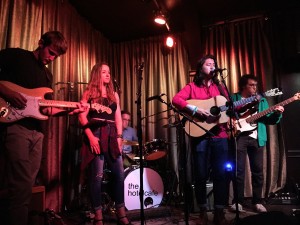
De Virgilio said it often takes a coincidental conversation to find students who play music on the side. He eventually found his current bassist, third-year Design | Media Arts student Miller Klitsner, while the two were rock climbing at the John Wooden Recreation Center. He said Klitsner mentioned his musical talents in passing.
“You know a lot of people play instruments here but it’s really behind closed doors,” de Virgilio said.
However, rather than waiting to stumble on potential bandmates at UCLA, some students search beyond the campus music scene. Third-year political science student Robert Abalos said he ultimately turned to friends outside of UCLA to form his group Triangle Fire. His three other band members study at Santa Monica College and Pasadena City College and have played together since high school.
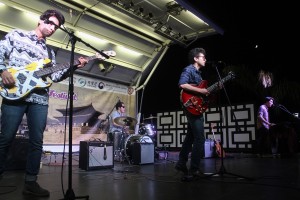
“Everyone at UCLA has their own commitments – they’re all doing so much already in school,” Abalos said. “They’re not necessarily ready to prioritize a band.”
The First Verse: Practicing to Perfection
The main commitment involved with a band comes down to rehearsal time, and members must be willing to sacrifice their free time to practice, Abalos said. For his band Triangle Fire, he returns to his hometown in East Los Angeles on the weekends to practice with the rest of his bandmates, often setting up jam sessions in their parents’ living rooms.
Ryan Nealon, a fourth-year ethnomusicology student and namesake of the 12-piece Ryan Nealon Band, said finding time to practice can be a logistical nightmare when there are many schedules to sync up, but adequate rehearsal time is nonetheless nonnegotiable for putting on a good show. He aims to hold several three-hour-long practice sessions before each performance, but scheduling rehearsals when all 12 members can be present is next to impossible, he said.
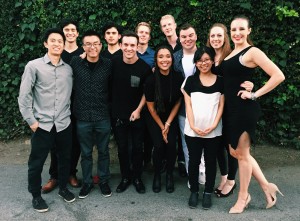
“The last time we played a show, we had 54 possible dates and times,” Nealon said. “(One bandmate) said he could only go to four of them.”
Securing a place to practice on campus can be just as challenging as making the time for rehearsal, de Virgilio said. His bandmates in Mr. Moon often practice around midnight in parking lots on campus.
“Usually we play on the roof of the parking lot because the sound dissipates more,” he said.
However, de Virgilio said practicing out in the open comes with added publicity perks.
“People sometimes stop by and come listen to us practicing and ask if we have any shows coming up,” de Virgilio said. “We once had two guys come up and asked if we played any hip-hop, so we said sure, and one of them started freestyle rapping with us.”
The Chorus: Stepping into the Spotlight
After several practice sessions, it’s time to take the stage. Barrosse said her performance career with the Eva B. Ross Foundation started with a casual concert on Bruin Plaza during her first year as part of a performance hosted by Musicians Match, an organization matching musicians for collaborations and performances. From there, she said opportunities to perform snowballed.
“UCLA is built in a way that if you put yourself out there, there are so many opportunities to play live,” Barrosse said. “We just started saying yes to everything … and as a result we got exposed to a lot of people early on.”
Since her debut on Bruin Plaza, Barrosse said the Eva B. Ross Foundation performed live frequently at Relay for Life, the Kerckhoff Coffeehouse concert series, “Art in the Union” and on-air for UCLA Radio. Some of Barrosse’s favorite gigs involve playing at fundraisers for campus clubs and organizations like Global Med and EuroBruins.
“When you play these fundraisers in Drake Stadium or Wilson Plaza, it’s a group of people who wouldn’t have seen you otherwise and are now being exposed to your music,” Barrosse said. “And the other cool thing is that you’re supporting a cause that you actually care about.”
Joel Moreno, a third-year applied mathematics student and frontman for garage rock band The Rosewaters, said his favorite types of gigs are do-it-yourself shows around campus on weekend nights. He said his venue of choice is the basement of the Co-Op on the corner of Ophir Drive and Landfair Avenue.
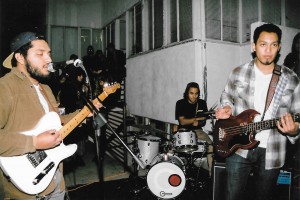
“It gets really hot and sweaty and people really like that grimy type of show, being in a small room and hearing great music and getting into it,” Moreno said. “I think there’s a sense of freedom.”
Abalos said performing on campus as part of the Kerckhoff concert series or at weekly Fowler Out Loud shows requires a little diligence and tact. Scheduling a slot at Kerckhoff requires inquiring with the Campus Affairs Commission, while a Fowler Out Loud booking requires calling the Fowler Museum venue directly.
Los Angeles also provides a bigger playground for student bands. Ensembles looking to play off-campus can do so at clubs and theaters in West Los Angeles like The Mint and The Hotel Cafe, Barrosse said. She said the best way to get a foot in the door at a club is to go through a booker, who will schedule a band if the ensemble can guarantee they will reach a quota of audience members.
“Bookers are really useful because they get you into clubs you wouldn’t normally play because you might not have the resume or following yet,” Barrosse said.
Although bookers can be an asset to a fledgling band, meeting the headcount demands can be difficult if the booker locks in a show on a less-than-ideal date, Nealon said. His first performance at The Mint had an exceptionally low turnout since it was scheduled on Good Friday in 2014.
“This booker wanted us to bring 70 people out and we brought eight,” he said “We basically got told, ‘You can’t come back again.’”
However, Nealon said after over a year of performing around Los Angeles, he returned with the Ryan Nealon Band to The Mint in July, this time opening for alumnus and former contestant on “The Voice” India Carney. He said the turnout this time around was a 180-degree flip from his first show at the club.
“It was the first time I had ever sold out a venue,” Nealon said.
Outro: A Long-Term Gig
Ultimately, creating a band and growing a following is similar to launching an enterprise in any industry, Abalos said.
“It’s a brand that you build,” he said. “You also have to put your passion and energy into it.”
Regardless of whether her band remains a sideline gig or grows into a full-time career, Barrosse said playing in a band will always be a passion project.
“It’s definitely more a labor of love,” Barrosse said. “Maybe in time it’ll be something we can survive off of, but until then I’ll probably still be working at the Hammer Museum on the side.”

